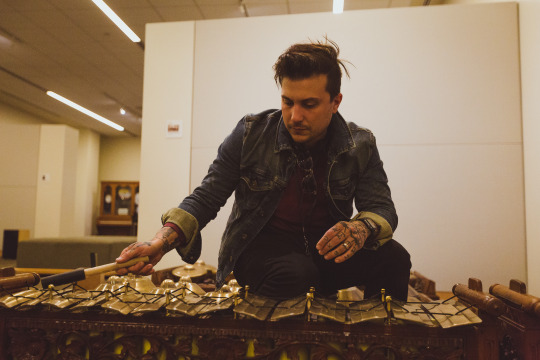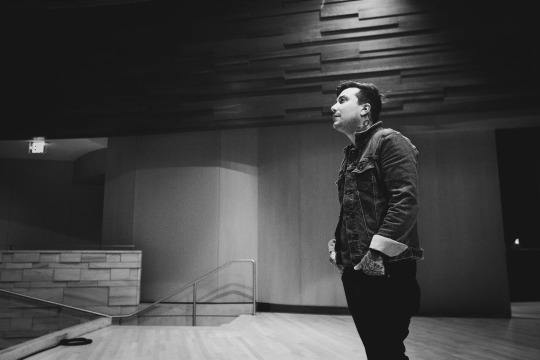
All photos by Julius Aguilar
When you think of Frank Iero, we’re sure a lot of things come to mind. He’s a musician, he’s a dad, he’s an active user on Twitter. What most people might not realize is that Frank Iero is a huge music fan – like, the guy knows way more about things you didn’t even know existed in the first place.
For example, take a certain guitar used by a late-60′s early-70′s band called The Wrecking Crew. Frank, being the musical factoid that he is, was able to spurt out knowledge dating back years from a recent documentary he had watched. Knowing this, we knew we had to take the former My Chemical Romance member to Arizona’s approximately 200,000 square-foot Musical Instrument Museum.
There, Frank and Noise contributor Jimmy Smith were able to walk the halls, discover instruments dating back to the 1800′s and discuss the upcoming Frank Iero And The Future Violents record Barriers.
For a glimpse into the knowledgable and insightful hang out, which also dove deep into Frank’s life-changing car accident between a city bus and his tour van, be sure to look below. Afterward, make sure to pre-order Frank’s forthcoming LP Barriers before it hits stores May 31st via UNFD.
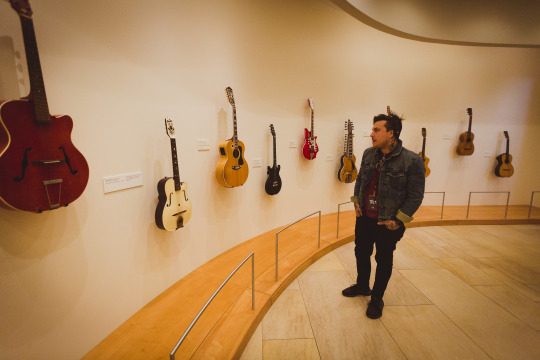
Alright, so maybe the easiest or the hardest question I’ll ask you all day: What was the best thing you saw here at the Musical Instrument Museum?
Oh man, Tommy Tedesco’s [Telecaster]. That was unreal. I had no idea that [they] had that here. Like, I’ve seen documentaries on The Wrecking Crew and you learn about the incredible players they all were and how many songs that particular guitar has been on that you wouldn’t even know. And just to kind of see it sitting there, it’s like, “Wow.”
Were there any out-of-the-box instruments you would want to get on a record of yours?
That’s the thing. Any chance you have to get an instrument in your hands and try to learn the inner workings of it and what kind of sound you can get out of it, that stuff’s amazing. I like to sometimes try to take a step back and approach it from a side I don’t know and think about like, “How would I think of this instrument if I had never seen anyone else play it before? Like, how would I get a sound out of it that I’ve never heard?” And that’s kind of fun.
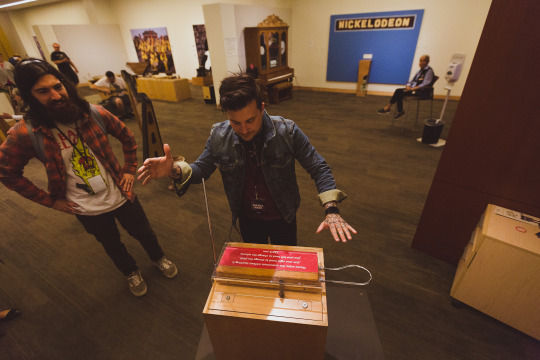
What do you think is the most unique instrument you’ve actually used on a record?
Well, early on in the My Chem days, a theremin was on [a record] but it’s definitely not like one [that’s noticable]. Because it was just really a bit of a little sprinkle on top. That’s an odd one to play. On this next record that we’re releasing at the end of May, there’s a song on Barriers called “Basement Eyes.” I wanted church bells, I wanted the chorus to have this Phil Spector kind of vibe with like percussion and almost like that feeling you get when you listen to The Crystals. “And Then He Kissed Me,” that kind of thing. So we rented this piano – I guess, you’re not going to be able to see this reading this – but it’s like a desktop kind of thing, like maybe three-and-a-half feet tall, not a lot of keys and maybe an octave and a half. It’s called a Viber-Charm and they sold it to churches that didn’t have a lot of money and didn’t have the pipe organ sort of church bells and they can play different things on this keyboard. And I mean, it had to be from like the 50s. [It had] braided cables, everything looked like it was going to catch on fire at any moment. And that made a resounding sound on that song. That’s how we achieved that.
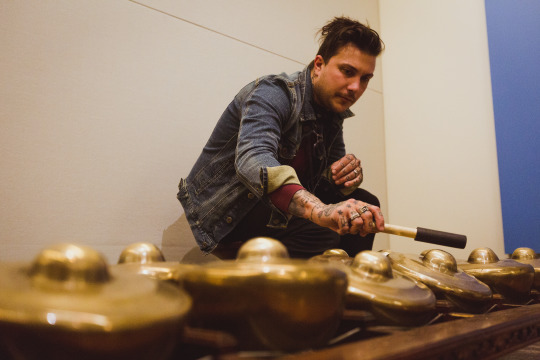
So obviously with every record you do you want to spice it up and do things differently. What else did you bring to the table this time around aside from adding new members?
Well, this was this is a fun one to do because I was able to really chase tones that I wanted to get. Usually, you don’t have a lot of time in a studio, especially when you’re a smaller artist or self-funding and stuff like that. [Usually,] you’re going into the studio with, you know, say 17 days or two weeks or something like that and you’re trying to get 12 to 14 songs out. This record, we did 17 days and we did 17 songs. Steve Albini is the one that engineered this record. He’s just such a master of his craft. And I mean, he’s the only person that you work with that doesn’t have any help, it’s just him in the studio. No ones there. Like someone goes and gets coffee sometimes. Other than that, like no one touches a microphone or anything. Like, he sets up everything himself. He’s at the board. He does edits on tape, of course, it’s like straight two-inch tape. You need someone that is so unbelievably versed in their craft to be able to make that time work. And we mixed in that amount of time as well.
Wow. Did you enjoy having that kind of time crunch?
[Laughs] There’s definitely a picture of me [and] the whole band at the end of the session I posted on my Instagram. I look like someone that is like, “Oh my god, I can’t believe we finished this.” And yeah, I mean, it’s hard. You sleep at the studio too. So you record [all day] and then you can go in after hours and work on stuff. But like, you’re there a lot and it’s the second time in my life that I had an episode of sleep paralysis. Like, one of the nights, I woke up and my brain had woken up first but my body didn’t. And I was like, “Oh no!” It’s the scariest experience ever. So I was definitely stressed. But we got it done.
Did the sleep paralysis affect any of the songs at all? Did it make you think differently about your lyrics maybe?
No [laughs]. Like, I’ve had it twice. Once it happened, I was in My Chemical Romance at the time, and I don’t know if we were recording but I was definitely stressed out. And I didn’t know what it was. And that [time] was like, “Oh man, there must be” – I was in a hotel, I was like, “This must be haunted.” Like, immediately I went to that because it feels like someone’s pushing you down and you can’t move at all but you’re fully awake and aware that you can’t move and that’s why it’s so scary. The second time it happened during this recording, I woke up and I was on my side, and I remember being like, “Oh no, it’s happened again” [laughs].
The ghost found you!
[Laughs] Yeah! The ghost found me! Like, “Oh great, he’s followed me now.” But I heard this – it almost felt like a laser starting from the top my head and going all the way down and I heard “zzzzzzzzzzz” like I was being scanned. It was crazy. And then when it finally got to my feet, [snaps] I woke up. I was able to come out of it and I immediately Googled it like “What the fuck is this?!” So I saw this sleep paralysis thing that said sometimes when your brain wakes up before your body, you can carry through a dream that you’re having. So if you’re having a nightmare, you’ll see things from your nightmare and that’s why people think it’s like, “Oh no, it’s a demon holding me” and it freaks you out. But it’s like, “Oh my god” [laughs].
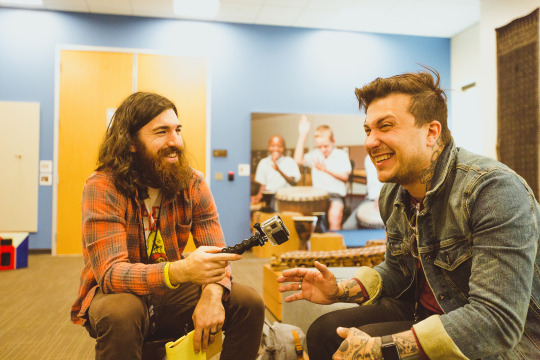
So just talking about the people you brought in for this record, some of them you’ve known for a very long time. Like Tucker Rule, for example. What is it like to get to play in a band with him?
Oh, man, it’s a dream come true. Like Matt [Amrstrong] too, I’ve known both of those guys since maybe 2000 or 2001. I saw them play in respected bands that I thought were just unreal. I mean, Thursday was one of the greatest live bands, and still is, that I’ve ever seen. And I remember being like, “Wow, I would love to play with Tucker.” And I got to play with Tucker later on in the 2000s when our drummer from My Chem Bob [Bryar] got sick and had to go home. I think Tucker came in for an Australian tour and that was really awesome. He was fantastic. I mean, he’s a fantastic drummer it was great to play with him. But I remember being like, “I wish I could write songs with him.” Like he’s playing parts that someone else wrote. And that’s always weird. It’s almost like putting on your dad’s suit. Like, you could look good in it but you’re never going to look like it’s yours.
So I was like, “Wouldn’t it be cool to be able to write songs with this guy?” And then Matt, he was in a band called Murder By Death. And I remember them when they were Little Joe Gould. And they came into the Eyeball [Records] family through Tucker and Thursday. And I remember being like, “Wow, I thought Thursday was good. Like, holy shit, this band is unreal!” And I mean, there was completely different instrumentation. Of course, there was a cello player and keyboard player and just the things that they were doing, I think let everyone in our little microcosm know it’s not just about “I got these four chords, I’m gonna write this song.” It’s like, “You should and can do so much more.” And I think that kind of blew the doors off for everybody and that’s when we started to really take it seriously and try to get better. I remember thinking like, “Oh man, how cool would it be to be in a band with that guy? That kid can play.”
So is it kind of weird to think in a weird way you’re sort of their boss since it’s your band?
It’s weird to be in that position because I never wanted that. I’ve always had bands and always started bands and ended up in that position because I was the one that started it or no one else wanted to do that job so it was like, “Alright. Well, someone’s got to do it, so I guess I’ll do it.” But I very much love that idea of a community being like, “Alright, we’re all in this together. We all have equal say.” I like the writing process of that where you bounce ideas off of each other.
So it was collaborative writing with all the members for this project?
For this one, a lot of the songs started just in my head and that’s kind of how this solo project has gone. But on this record in particular, because I think we had such high caliber musicians, two songs started with ideas that my brother Even Nestor had. And two songs, one of which made the record, started with Matt. So that was a kind of a thing like, “Hey, I have this riff. Do you think we could use it?” And we would jam out on it and all of a sudden it’s a song.
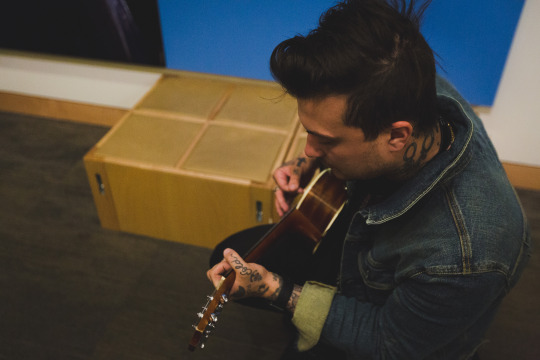
Do you have a favorite song on the record?
I do [laughs].
Which one is it?
It’s called “Medicine Square Garden.” It was one of those where I wrote it, had it in my head and I was like, “This is going to be really difficult to explain to someone how this song is supposed to go.” And it’s either going to work or it’s not. It’s going to be one of those things where if it doesn’t work, I’m going to be bummed because I think it’s really good but I need people to like – I don’t think I could have done it with anybody else other than this bad. It’s crazy. It’s one of those songs that I really took a leap of faith on. And since it did pay off and it is still one of my favorite songs, I feel like that’s how I knew it it was a successful record.
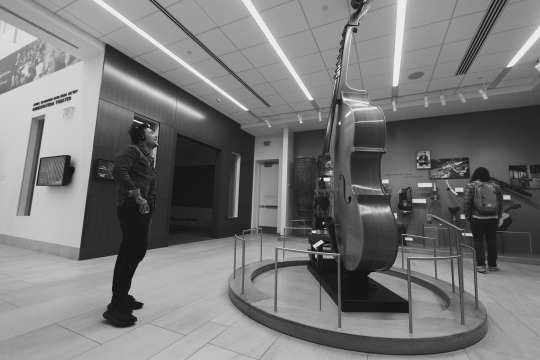
Getting to hear the record early, it’s interesting that after your accident, you could have gone two ways with how you wrote it: Angry and pissed off at the world or calm and just looking to get back to basics. Was that something you considered when writing Barriers?
Well I think for me, having that accident, I knew I couldn’t write a record without addressing it because it was such a huge moment in my life and it changed everything. I knew I’m a different person because of it. And there was this huge elephant in the room that I knew I had to talk about and I had to address it and it had to be, if not a focal point of the record, it had to be – just, it was there within everything I was writing so I needed something to be dedicated to it. But everything I started to write about just didn’t feel right. Like I didn’t feel like I was getting everything out the way you do, there’s so much to say. And the words just weren’t there. I would write something and be like, “that doesn’t sum it up.” It’s hard to sum up a life-changing experience like that. So that was kind of my wall that I had. And I didn’t think I was going to be able to do a record. That’s why too I was like, “You know, I’m just gonna take some time.” And it just so happened that Tucker ended up being free. Matt became free. Evan was free and then, Kayleigh Goldsworthy, who’s the fifth member of the band. And that’s when I was like, “Oh man, this is a sign. It’s like now or never. If I don’t write the songs, then I’m gonna miss out.” So then all of a sudden, it all started to come out and this song called “Six Feet Down Under” emerged. And it’s basically just my conversation with my therapist of trying to explain how I’m feeling and like, “I know you’re trying to help and the things you’re saying are very nice and they come from a good spot and I know you’re really smart and that’s really awesome but like it doesn’t mean anything [laughs] if I can’t believe that this is all real.” And getting that across, I think really opened the floodgates for me to be able to finish everything else.
Have you had a wall like that in your songwriting career before?
That was a huge one.
Was there anything similar to that previously?
Minor things. You know, there’s some childhood things that you have a hard time fully grasping until you get older. Like the divorce of my parents and things of that nature, like trying to make sense of all that. Family, addiction and certain things that I went through. But nothing like this one, because I feel like this was – it’s weird. Childhood trauma evolves. You know, you start to see different sides of things and you’ve had the time – there are some people that say “You have your entire life to write your first record” and then you have like maybe six months to write your second basically. With this one, it was still so fresh. And [the accident] happened to me in my adulthood. It happened at a time where I kind of felt like – like, I had a family. I thought I had things figured out. And immediately [snaps] everything changed.
It shook you up a little.
Yeah, absolutely. I feel like at 25 you go crazy. 30 you’re like, “Alright, I’m okay with not knowing everything.” Around 35 you’re like, “Well, I’m starting to get my shit together. And then you get hit by a bus” [laughs]. And you’re like, “Oh man, I know nothing again.”
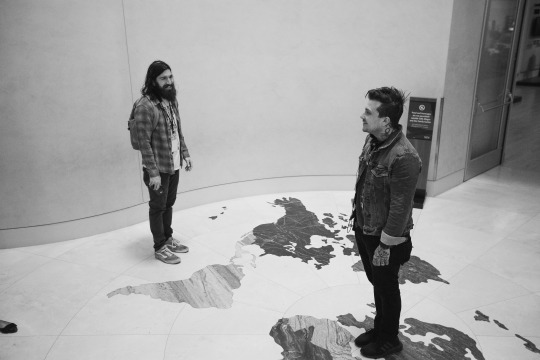
Okay, so then just wrapping up. I was wondering if your three band names – the Cellabration, the Patience, and The Future Violents – have any sort of connection?
So the Cellabration was, in my head, it was my first time as a solo artist and I didn’t feel comfortable in that role so I wanted to bring along something that felt boisterous and exciting so that would take away from my, you know, like, “It’s just me up here. It’s weird” [feeling]. And I spelled it differently because I like the idea of it being like a cellular thing, like this building block of life and it’s going to start from here and evolve and grow and change. So that’s where that came from. The Patience was me kind of getting over the idea that I needed something to take away from me. I really wanted something that would kind of even me out and just that self-fulfilling prophecy of bringing this virtue along where you kind of take a step back and appreciate the now. I’ve spent so much time like, “What’s next, what’s next? Alright, this tour is going, alright, cool. I’m gonna get home here and then when I’m home, the next tour I’m going to do is this.” And it’s like, you live so fast that you don’t appreciate what’s actually happening. And I don’t want that.
And then this time around, The Future Violents, I started to think about how life is kind of this – it’s like you’re staring at a lake and you can passively take it all in and see the things swimming underneath and maybe how the wind kind of takes the current. And we do that sometimes, we live vicariously through other people and sometimes, you know, just having it be serene is nice. And then the “active” way to live by is to kind of pick up a stone on the side and throw it in and see the ripples that go on and really affect it. And I think that act is a violent act that disrupts things [but] doesn’t have to necessarily have a negative connotation. You know, it’s about leaving a footprint and changing things and being conscious enough to want to disrupt what’s there and hopefully in a positive way and see that ripple go on and affect other people and like bellow out. So, collectively, I’d like to think that the band and the people that are listening to this record are The Future Violents, the ones that go out and create a change and hopefully listen to this record that we’ve made – a record that I used to break down these walls and barriers that I had set up – and use it to destroy their own barriers and go out there and do things that scare the fuck out of you. Because that’s the only time that we do something really wonderful is when we’re so frightened that we’re not going to do it right. And that’s the best part.
